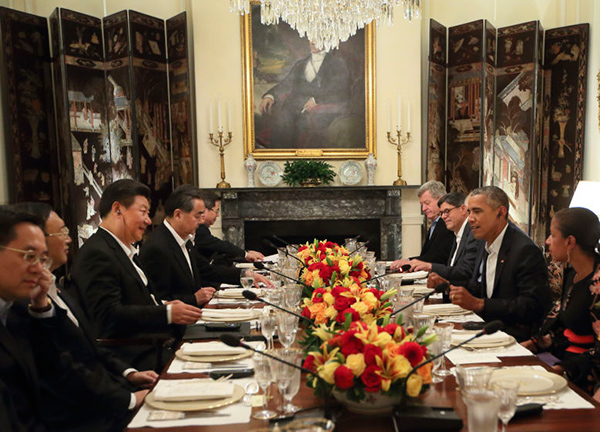Xi, Obama hold a three-hour-long talk
 0 Comment(s)
0 Comment(s) Print
Print E-mail Xinhua, September 25, 2015
E-mail Xinhua, September 25, 2015
|
|
| US President Barack Obama hosts a private dinner for Chinese President Xi Jinping at Blair House in Washington DC, September 24, 2015. [Photo/Xinhua] |
Chinese President Xi Jinping and his U.S. counterpart, Barack Obama, exchanged views on governance, bilateral ties and other issues of common concern in a three-hour-long talk in the Blair House Thursday night.
Recalling their previous meetings in California of the United States and in Beijing, Xi said such in-depth communications help chart the course for and inject vigor into the development of China-U.S. relations.
Besides, Xi said that reform and opening up are basic state policies of China and fundamental driving forces for the country's future development.
"China will never close its door to the outside world," he said, pledging a more open, relaxed and transparent environment for foreign companies to invest and operate in China.
Sticking to the path of peaceful development is a strategic choice China has made based on objective judgements of the past, the present and the future, Xi said, adding that his country will also unswervingly safeguard its sovereignty, security and development interests.
Pointing out that China is a participator, constructor, contributor as well as a beneficiary of existing international system, Xi said reforming and adjusting the current system is not about creating a new one, rather, they are aimed to make it more just and rational.
China's Belt and Road initiative and proposal for the Asian Infrastructure Investment Bank are both open, transparent and inclusive, and are conducive to economic development, employment and poverty reduction in relevant countries, Xi said.
China welcomes all countries, including the Untied States, to take part in the processes, he added.
For his part, Obama said his country welcomes the peaceful development of China, and that a stable and prosper China is in line with the interests of not only the Chinese people, but also the American people and the international community as a whole.
U.S.-China collaboration in climate change and in helping West Africa combat the deadly Ebola epidemic are both paradigms of bilateral cooperation in addressing global challenges, Obama said.
China and other emerging countries deserve more say and representative in international system in this polarized world, he said, adding the United States expects China to play a more important role on world stage.
Meanwhile, Xi stressed that China and the Untied States should enhance strategic mutual trust at high level. "I've said many times that the Pacific Ocean is big enough for the development of both China and the United States," he said.
It is a priority in foreign policy of China to develop a relationship with the United States that features no confrontation, no conflict, mutual respect and cooperation for win-win results, he said.
Xi said China and the Untied States have achieved significant and positive progress in relations since he met Obama at the Annenberg estate in 2013.
The achievements, realized under the joint efforts of China and the Untied States, were hailed by not only the Chinese and American people, but also the international community as a whole, he said.
Xi pointed out that, in overall, China and the United States have much more common interests than divergences, and that cooperation has always been the mainstream.
Facts have proven that the goal of building a new type of major-country relationship between China and the United States is not only correct, but also of great vitality, Xi said, calling on the two countries to strengthen high-level exchanges, expand cooperation, handle differences properly and enhance guidance of public opinion, to maintain a sound momentum and lay a solid foundation for the future development of bilateral ties.
Obama said he doesn't believe in the "Thucydides trap" where conflicts are inevitable between existing and emerging powers, urging major countries, the United States and China in particular, to avoid conflicts.
Obama said he is confident that the United States and China have the ability to manage differences, and that competition between the two countries is constructive and positive.
The Chinese president arrived in Washington earlier Thursday after a busy two-and-a-half-day stay in West Coast hub Seattle, continuing his first ever state visit to the United States.







Go to Forum >>0 Comment(s)